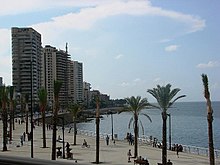
Back ثقافة لبنان Arabic Livan mədəniyyəti Azerbaijani Cultura del Líbano Spanish فرهنگ لبنانی Persian Culture du Liban French लेबनान की संस्कृति Hindi ლიბანის კულტურა Georgian Libano kultūra Lithuanian Kebudayaan Lubnan Malay ਲਿਬਨਾਨ ਦਾ ਸਭਿਆਚਾਰ Punjabi
| Part of a series on the |
| Culture of Lebanon |
|---|
 |
| People |
| Languages |
| Cuisine |
| Religion |
| Art |
| Literature |
| Music |
| Sport |






The culture of Lebanon and the Lebanese people emerged from Phoenicia and through various civilizations over thousands of years. It was home to the Phoenicians and was subsequently conquered and occupied by the Assyrians, the Greeks, the Romans, the Persians, the Arabs, the Crusaders, the Ottomans and the French. This variety is reflected in Lebanon's diverse population, composed of different religious groups, and features in the country's festivals, literature, artifacts, cuisine and architecture of Lebanon. Despite colonization by different entities genetic testing has revealed that 89% of Lebanese people today descend from the Phoenicians. Regardless of religion or colonization which were layers of paint on top.
The Maronite, Muslim and the Druze founded modern Lebanon in the early eighteenth century, through the ruling and social system known as the "Maronite-Druze dualism" in Mount Lebanon Mutasarrifite.[1] Despite the religious and denominational diversity of the Lebanese, they "share an almost common culture".[2] Article 11 of the Constitution of Lebanon states: "Arabic is the official national language. A law determines the cases in which the French language is to be used". The spoken Lebanese Arabic dialect used in public mixes Arabic with French. Cuisine and literature are deep-rooted "in wider Mediterranean and Levantine norms".[2]
The hilly Mediterranean geography of Lebanon has played a role in shaping the history of Lebanon and its culture. Archaeology of Lebanon is conducted to explore the region's past.
- ^ Deeb, Marius (2013). Syria, Iran, and Hezbollah: The Unholy Alliance and Its War on Lebanon. Hoover Press. ISBN 9780817916664.
the Maronites and the Druze, who founded Lebanon in the early eighteenth century.
- ^ a b Stokes, Jamie. Encyclopedia of the Peoples of Africa and the Middle East, page 406